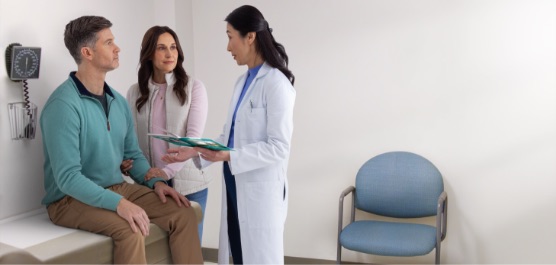
Advocating for your loved one
Communicating with healthcare providers and other professionals can be intimidating. They are experts in their fields and may have experience with HD. However, when it comes to your loved one and their goals, you are the expert.
When caring for a loved one with HD, remember:
- Your loved one cannot always simply “try harder” to accomplish tasks, and their hesitations or avoidance are not signs of laziness.
- You are the eyes and ears of the rest of the care team. Be on the lookout for any changes that may be a symptom of HD or the progression of an existing symptom.
- You may notice the effects of HD before your loved one does. It is not uncommon for those with HD to be unaware of their symptoms and their impacts.
- You are also a voice for your loved one. To get them the best possible care, alert your care team if you notice any new or worsening symptoms and their impacts.

And even more difficult when your concerns are met with resistance or challenging behaviors.
Your loved one may deny their symptoms, become defensive, or react unexpectedly.

Caregivers need care, too
Being a caregiver is a lot of work and can lead to burnout or exhaustion if you don’t make time to take care of yourself.
10 ways caregivers can care for themselves:
Making the time to practice self-care can be overwhelming in and of itself. Consider asking trusted friends and family for help when you need it so that you can make the time to focus on your own well-being.
Find more caregiving tips and resources from the HD community:
Connect with other caregivers
It can be easy to feel overwhelmed by the pressure of caring for a loved one with HD—and yourself.
But you are not alone.
The HD community is strong and active, and support groups are available to help caregivers and families too.
Support groups to consider:
Caregiver Action Network
The Caregiver Action Network is the leading advocacy and support network in the US for families and caregivers of people with chronic conditions and diseases.
Family Caregiver Alliance
The FCA is an advocacy and policy organization that provides support services to and advocates for families and caregivers across the US.
Huntington's Disease Society of America (HDSA)
The US-based HDSA is one of the world’s premier HD education, advocacy, and research nonprofit organizations.
National Alliance for Caregiving
The NAC is a coalition of non-profit groups offering support for and advocacy of family caregivers.
Give yourself the time to find a group that works for you, so you don’t have to handle this journey on your own. It can be a great relief to share your feelings and experiences with people who have faced the same challenges—and achievements.
Sign up for HD info
Learn about treatment options, tips for living with HD, and useful links and resources.
Sign upAfter your HD diagnosis
Read “After Your HD Diagnosis” for tips and resources for people and families affected by HD.
Download brochure (opens in a new tab)











